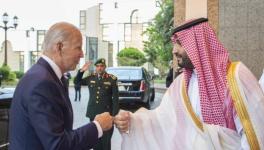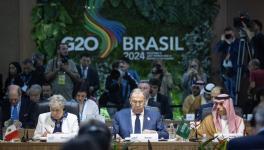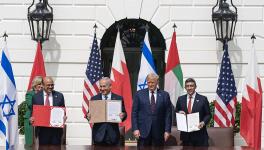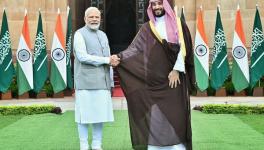Breaking Europe’s Hold on Football
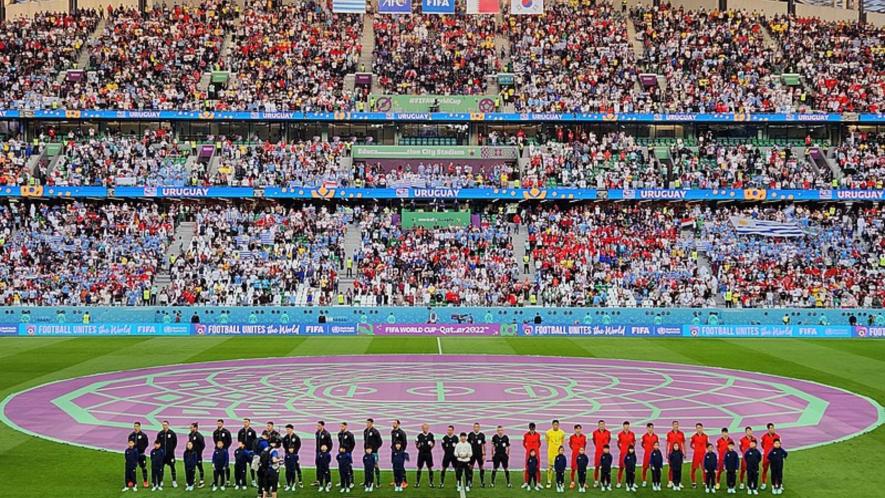
2022 FIFA World Cup Qatar. Image Courtesy: Wikimedia Commons
The 2022 FIFA World Cup in Qatar brought together nations from around the world, and 1.5 billion people tuned in to watch the final. But while soccer is a source of local pride, passion, and personal and community identity globally, its official governing institution is headquartered in Europe. Founded in Paris in 1904 and now based in Switzerland, the Fédération Internationale de Football Association (FIFA) oversees international soccer promotion and development, from rule changes to hosting rights for major tournaments.
The Union of European Football Associations (UEFA), alongside England’s Premier League (EPL), Germany’s Bundesliga, Spain’s LaLiga, Italy’s Serie A, and France’s Ligue 1, play significant roles in global soccer and generate substantial revenue for FIFA. European clubs and national teams attract top talent, and through “sports diplomacy,” can project their cultural, political, and economic interests to the world and influence FIFA.
This dominance has long been a source of criticism. African teams in 1966 organized boycotts to protest their lack of representation at the World Cup. Even UEFA and João Havelange, president of FIFA from 1974 to 1998, became increasingly critical of each other, while Havelange’s successor, Sepp Blatter, also criticised FIFA’s Eurocentric influence in 2015.
Recently, this strain of critique has become even more apparent. During the 2022 World Cup in Qatar, European teams were rebuked by FIFA to abandon plans to wear pro-LGBT armbands, while UEFA-affiliated teams and FIFA clashed over Qatar’s human rights record in the lead-up to the tournament. But throughout 2023, Europe’s traditional dominance has been challenged by notable developments in Saudi Arabia and the United States.
Saudi Arabia’s Vision 2030, announced in 2016, aims to diversify its economy and attract foreign investment. While hosting and sponsoring motorsports, golf, boxing, and other sports tournaments form part of this, soccer serves as the cornerstone of Riyadh’s attempts to portray and promote the country. This charm offensive has drawn Western allegations of “sportswashing,” wherein sports are used to improve a country’s public image and divert attention from negative actions.
Like other Gulf States, Saudi Arabia has purchased major European teams in recent years. Saudi Arabia’s Public Investment Fund acquired the EPL’s Newcastle United in 2021, and Sheffield United, bought by the Saudis in 2013, will again play in the EPL in the 2023-24 season. The Saudis also reportedly made a multibillion-dollar bid to buy the EPL’s Chelsea, while tournaments like the Supercoppa Italiana and Spanish Super Cup are increasingly held in Saudi Arabia.
Nevertheless, Riyadh’s major sporting aim is to elevate the prestige of the Saudi Professional League (SPL). With backing from the oil-fueled Public Investment Fund, the Saudis have invested heavily in the SPL, turning it into one of the world’s most high-profile leagues. This investment has already yielded results—SPL team Al-Hilal finished as runners-up in the 2022 FIFA Club World Cup, losing to Spanish club Real Madrid.
In 2023, a series of high-profile SPL deals poached top talent from Europe and around the world. Unconstrained by UEFA’s spending limits, Saudi clubs snatched up players like Portugal’s Cristiano Ronaldo, Senegal’s Édouard Mendy, England’s Jordan Henderson, Spain’s Gabri Veiga, and Brazilian superstar Neymar. While some are nearing the end of their careers, others are in their primes or just beginning, and SPL clubs have also managed to attract notable coaches.
Concerns have grown over Saudi Arabia’s influence in global soccer, with human rights issues often cited. Saudi Arabia was prohibited from sponsoring the FIFA Women’s World Cup in Australia and New Zealand in 2023 due to these concerns. However, upcoming efforts will continue to boost Saudi Arabia’s soccer standing, including hosting the men’s FIFA Club World Cup in December 2023 and exploring cohosting the 2030 FIFA World Cup with Egypt and Greece, with an offer to finance their new stadiums if three-quarters of the matches are played in Saudi Arabia.
Amid increasing Saudi attempts to influence FIFA and the global soccer stage, US entities have also made major inroads. In the EPL, eight of 20 teams are now fully or partially US-owned. However, like Saudi Arabia, the primary US challenge to European soccer dominance stems from the growth of its domestic league, Major League Soccer (MLS). The league has seen steady growth for decades, aiming to tap into the potentially massive domestic US market.
Following the success of the 1994 FIFA World Cup held in the US, the MLS’s inaugural season commenced in 1996. MLS received a significant boost in 2007 with the signing of English superstar David Beckham to the LA Galaxy. The contract introduced the designated player rule, enabling teams to exceed the salary cap for certain players, and included a clause allowing Beckham to purchase the rights to an expansion team after his five-year contract ended.
Since then, MLS has expanded from 13 to 29 teams, and Beckham now co-owns Inter Miami, which signed Argentina’s Lionel Messi in mid-2023 from French club Paris Saint-Germain. Messi’s contract includes an equity share in Inter Miami, illustrating how MLS continues to attract superstars by giving them a vested interest in the league.
Since Messi’s signing, MLS has experienced what is known as the “Messi effect.” Inter Miami has witnessed record jersey sales, hundreds of millions of dollars in ticket sales, and has gained 14 million Instagram followers. Apple’s streaming service for MLS games has gained almost 300,000 subscribers as of September 7, and celebrities at recent Miami games included Leonardo DiCaprio, LeBron James, and Prince Harry. Other soccer stars who recently joined Miami include Messi’s former Barcelona teammates Sergio Busquets and Jordi Alba.
MLS’s growth has also been fuelled by the significant increase in the Latino population since its 1996 inception, capitalising on Latin America’s passion for the sport, as well as the success of the US national women’s team in recent years. To strengthen ties to Latin America, a new expanded Leagues Cup between MLS and Mexico’s Liga MX commenced in 2023, with Inter Miami emerging as victors.
The US will host the 2024 Copa América in coordination with the Confederation of North, Central America and Caribbean Association Football (CONCACAF), and South American Football Confederation (CONMEBOL). The US, Mexico, and Canada will also host the 2026 Men’s World Cup.
Younger Americans are also increasingly interested in soccer, and in an attempt to match European youth development leagues, MLS launched MLS Next in 2020 (the Saudis launched their own in 2023). The US now has the largest number of youth players playing soccer recreationally, with European leagues increasingly recruiting talent from MLS.
FIFA is naturally keen to capitalise on MLS’s potential for growth. The US is already one of FIFA’s most important revenue sources for the FIFA World Cup, both in terms of sponsoring brands and in the number of citizens traveling to World Cups. FIFA may also be looking to appease Washington. In 2015, American officials initiated a series of legal actions and investigations into corruption in FIFA, and in 2020, the Justice Department accused FIFA of accepting bribes from Qatar and Russia to secure their World Cup hosting bids.
Nonetheless, both the SPL and MLS trail the major European leagues in viewership. Saudi and American soccer stadiums are generally far smaller than their European counterparts, and their teams also lack the prestige of established European teams. MLS salaries are still lower than in Europe, and while some clubs have enjoyed financial success, more than half of MLS teams still lose money. U.S. sports culture still favors other sports, and both the EPL and Mexico’s Liga MX also have higher viewership in the US than MLS.
UEFA’s dominance over FIFA has also thwarted previous challenges. The US launched the International Soccer League in 1960 but it faltered after five years, overshadowed by the Intercontinental Cup featuring the best teams from Europe and South America (later evolving into the FIFA Club World Cup). More recently, the Chinese Super League struggled after huge investments beginning in 2017.
But historical discontent within UEFA also recently resurfaced. Frustration has led to two attempts, one in 1998 and one in 2021, to establish a separate “Super League” outside of FIFA and UEFA control. The influx of money from Russia, Gulf states, and the US into European clubs over the last few decades played an essential role in fuelling discontent from major teams toward UEFA and its Financial Fair Play regulations.
UEFA’s chief Aleksander recently brushed off concern over the SPL’s spending spree and has remained largely silent on the MLS. Nonetheless, these simultaneous challenges have undermined Europe’s traditional global soccer dominance.
Furthermore, suspicions have arisen that Chelsea owners Todd Boehly and Clearlake Capital, a US investment firm, are offloading Chelsea players to the SPL at inflated prices, suggesting how influential Saudi and US figures have become even in Europe’s football world.
The SPL and MLS may breathe new life into FIFA by allowing the organisation’s resources to be distributed more evenly. However, the significant influence of Saudi and American money in enhancing their profiles raises concerns that decentralising global soccer could merely shift the source of financial power from Europe to new players, potentially introducing a different set of challenges. FIFA must navigate this shift carefully, aiming for true equity without creating fresh imbalances.
John P. Ruehl is an Australian-American journalist living in Washington, D.C. He is a contributing editor to Strategic Policy and a contributor to several other foreign affairs publications.
Source: This article was produced by Globetrotter.
Get the latest reports & analysis with people's perspective on Protests, movements & deep analytical videos, discussions of the current affairs in your Telegram app. Subscribe to NewsClick's Telegram channel & get Real-Time updates on stories, as they get published on our website.











